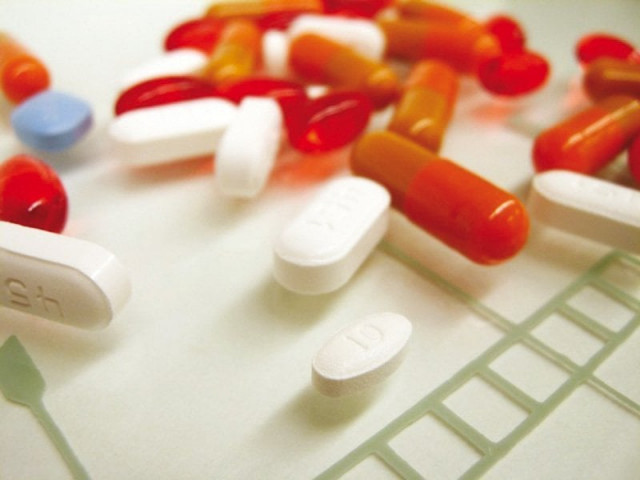Pharma firms decide to drop objections to drug policy
Medicine prices will be adjusted according to inflation from July 2016.

Medicine prices will be adjusted according to inflation from July 2016. STOCK IMAGE
Now the government, which wanted to approve the new drug policy last month, will take it soon to the Economic Coordination Committee (ECC) for approval, he said.
“We have decided to let the government clear the policy draft with an understanding that the two parties – the government and the industry – will continue to engage in talks even after the approval of the policy,” an industry official privy to the negotiations with the government told The Express Tribune on condition of anonymity.
The industry reached the understanding with the government after showing some ‘flexibility’ over the pricing issue. The middle ground on various mechanisms will certainly help the industry’s growth in the future, he added.
Top representatives of the national and multinational pharmaceutical companies met the newly appointed Drug Regulatory Authority of Pakistan (Drap) Chief Executive, Mohammad Aslam Afghani, in Lahore to settle the differences over the pricing issues.
Though the meeting remained inconclusive as Drap could not bring changes in the policy draft before its approval by the ECC, the industry official said that the two parties have decided to continue discussions.
According to him, one of the most important features of the new policy is the process of automation of the drug pricing mechanism. From July 2016, drug prices will be automatically adjusted according to the changes in the Consumer Price Index (CPI).
This mechanism will bring stability in the industry as well as in prices of drugs. In future, the drug producers will be satisfied, as they will be certain of receiving the minimum profit margins on any drug they produce after July 1, 2016, he added.
Furthermore, the government and the industry will also review the prices of drugs in India and compare them with prices in Pakistan. If some particular drugs are not produced in India, prices of those drugs in the United Kingdom and Australia will be taken as the benchmark to adjust prices in the country.
“The new scientific formula to settle the prices of drugs will help spur investment in the pharmaceutical sector,” he added.
Dispute dragged on
The government is not allowing companies to raise prices of 318 molecules that form the components of hundreds of drugs and is forcing them to reduce prices by as much as 30%.
In November 2013, the government’s Drug Pricing Committee (DPC), a division of Drap, went back on an earlier decision to allow pharmaceutical firms to raise prices by up to 15%.
Resultantly, pharmaceutical companies sued the government and were able to get a stay order from the Sindh High Court to keep the price increases while the matter was resolved.
According to industry officials, the government has not allowed across-the-board increase in prices of medicines since 2001 and now Drap appears to be continuing with the same policy or even introducing an average pricing formula, which pharma companies insist will be detrimental to their financial health.
Pharma companies, especially multinationals, argue that the frozen drug prices for over a decade has forced many renowned companies to leave Pakistan and discouraged new investments into the sector.
They say this is why there is not a single Food and Drug Administration (FDA or USFDA) – a key benchmark to get international recognition that helps in exporting medicines – approved plant in Pakistan.
On the other hand, India has 90 FDA-approved plants, Italy has 40, China has 22, Taiwan has 10, Bangladesh has four and Jordan has three units.
Drap – which was constituted in November 2012 after the functions of the federal health ministry were transferred to the provinces in June 2011 – is an autonomous regulatory body charged with regulating issues related to drug prices, licensing and inspecting drug manufacturers, and drug registration for local manufacturing or imported medicines.
The writer is a staff correspondent
Published in The Express Tribune, February 9th, 2015.
Like Business on Facebook, follow @TribuneBiz on Twitter to stay informed and join in the conversation.



















COMMENTS
Comments are moderated and generally will be posted if they are on-topic and not abusive.
For more information, please see our Comments FAQ